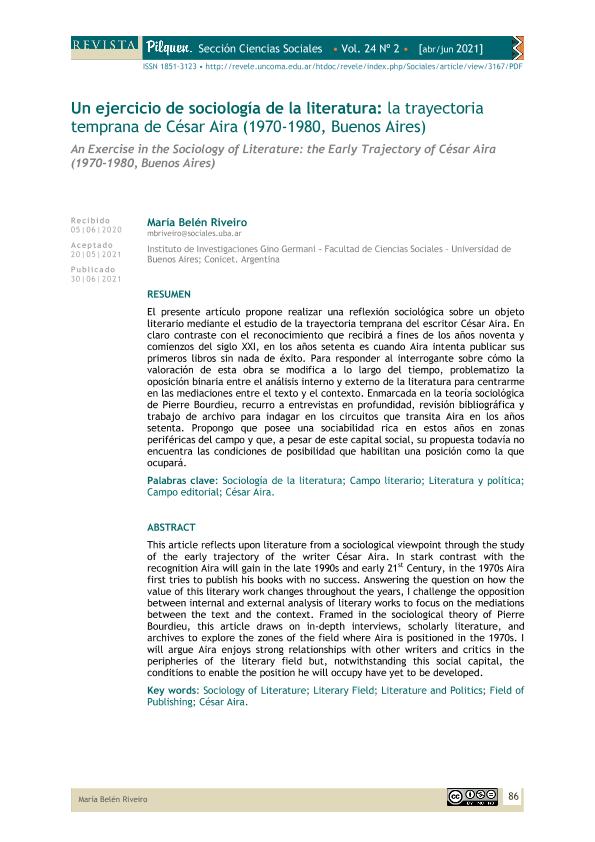Mostrar el registro sencillo del ítem
dc.contributor.author
Riveiro, María Belén

dc.date.available
2022-08-16T15:49:15Z
dc.date.issued
2021-07
dc.identifier.citation
Riveiro, María Belén; Un ejercicio de sociología de la literatura: La trayectoria temprana de César Aira (1970-1980, Buenos Aires); Universidad Nacional del Comahue. Centro Universitario Regional Zona Atlántica; Pilquén: Sección Ciencias Sociales; 24; 2; 7-2021; 86-98
dc.identifier.issn
1666-0579
dc.identifier.uri
http://hdl.handle.net/11336/165651
dc.description.abstract
El presente artículo propone realizar una reflexión sociológica sobre un objeto literario mediante el estudio de la trayectoria temprana del escritor César Aira. En claro contraste con el reconocimiento que recibirá a fines de los años noventa y comienzos del siglo XXI, en los años setenta es cuando Aira intenta publicar sus primeros libros sin nada de éxito. Para responder al interrogante sobre cómo la valoración de esta obra se modifica a lo largo del tiempo, problematizo la oposición binaria entre el análisis interno y externo de la literatura para centrarme en las mediaciones entre el texto y el contexto. Enmarcada en la teoría sociológica de Pierre Bourdieu, recurro a entrevistas en profundidad, revisión bibliográfica y trabajo de archivo para indagar en los circuitos que transita Aira en los años setenta. Propongo que posee una sociabilidad rica en estos años en zonas periféricas del campo y que, a pesar de este capital social, su propuesta todavía no encuentra las condiciones de posibilidad que habilitan una posición como la que ocupará.
dc.description.abstract
This article reflects upon literature from a sociological viewpoint through the study of the early trajectory of the writer César Aira. In stark contrast with the recognition Aira will gain in the late 1990s and early 21st Century, in the 1970s Aira first tries to publish his books with no success. Answering the question on how the value of this literary work changes throughout the years, I challenge the opposition between internal and external analysis of literary works to focus on the mediations between the text and the context. Framed in the sociological theory of Pierre Bourdieu, this article draws on in-depth interviews, scholarly literature, and archives to explore the zones of the field where Aira is positioned in the 1970s. I will argue Aira enjoys strong relationships with other writers and critics in the peripheries of the literary field but, notwithstanding this social capital, the conditions to enable the position he will occupy have yet to be developed.
dc.format
application/pdf
dc.language.iso
spa
dc.publisher
Universidad Nacional del Comahue. Centro Universitario Regional Zona Atlántica
dc.rights
info:eu-repo/semantics/openAccess
dc.rights.uri
https://creativecommons.org/licenses/by-nc-nd/2.5/ar/
dc.subject
SOCIOLOGÍA DE LA LITERATURA
dc.subject
CAMPO LITERARIO
dc.subject
LITERATURA Y POLÍTICA
dc.subject
CAMPO EDITORIAL
dc.subject
CÉSAR AIRA
dc.subject.classification
Sociología

dc.subject.classification
Sociología

dc.subject.classification
CIENCIAS SOCIALES

dc.title
Un ejercicio de sociología de la literatura: La trayectoria temprana de César Aira (1970-1980, Buenos Aires)
dc.title
An exercise in the sociology of literature: The early trajectory of César Aira (1970-1980, Buenos Aires)
dc.type
info:eu-repo/semantics/article
dc.type
info:ar-repo/semantics/artículo
dc.type
info:eu-repo/semantics/publishedVersion
dc.date.updated
2022-08-16T11:58:47Z
dc.identifier.eissn
1851-3123
dc.journal.volume
24
dc.journal.number
2
dc.journal.pagination
86-98
dc.journal.pais
Argentina

dc.journal.ciudad
Viedma
dc.description.fil
Fil: Riveiro, María Belén. Consejo Nacional de Investigaciones Científicas y Técnicas; Argentina. Universidad de Buenos Aires. Facultad de Ciencias Sociales. Instituto de Investigaciones "Gino Germani"; Argentina
dc.journal.title
Pilquén: Sección Ciencias Sociales
dc.relation.alternativeid
info:eu-repo/semantics/altIdentifier/url/http://revele.uncoma.edu.ar/index.php/Sociales/article/view/3167
Archivos asociados
